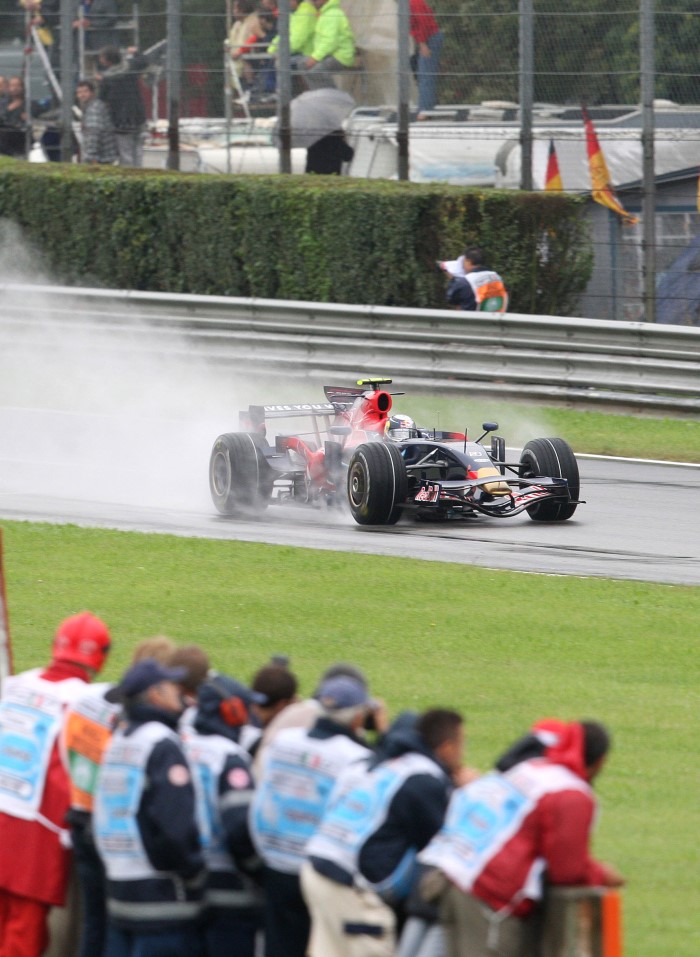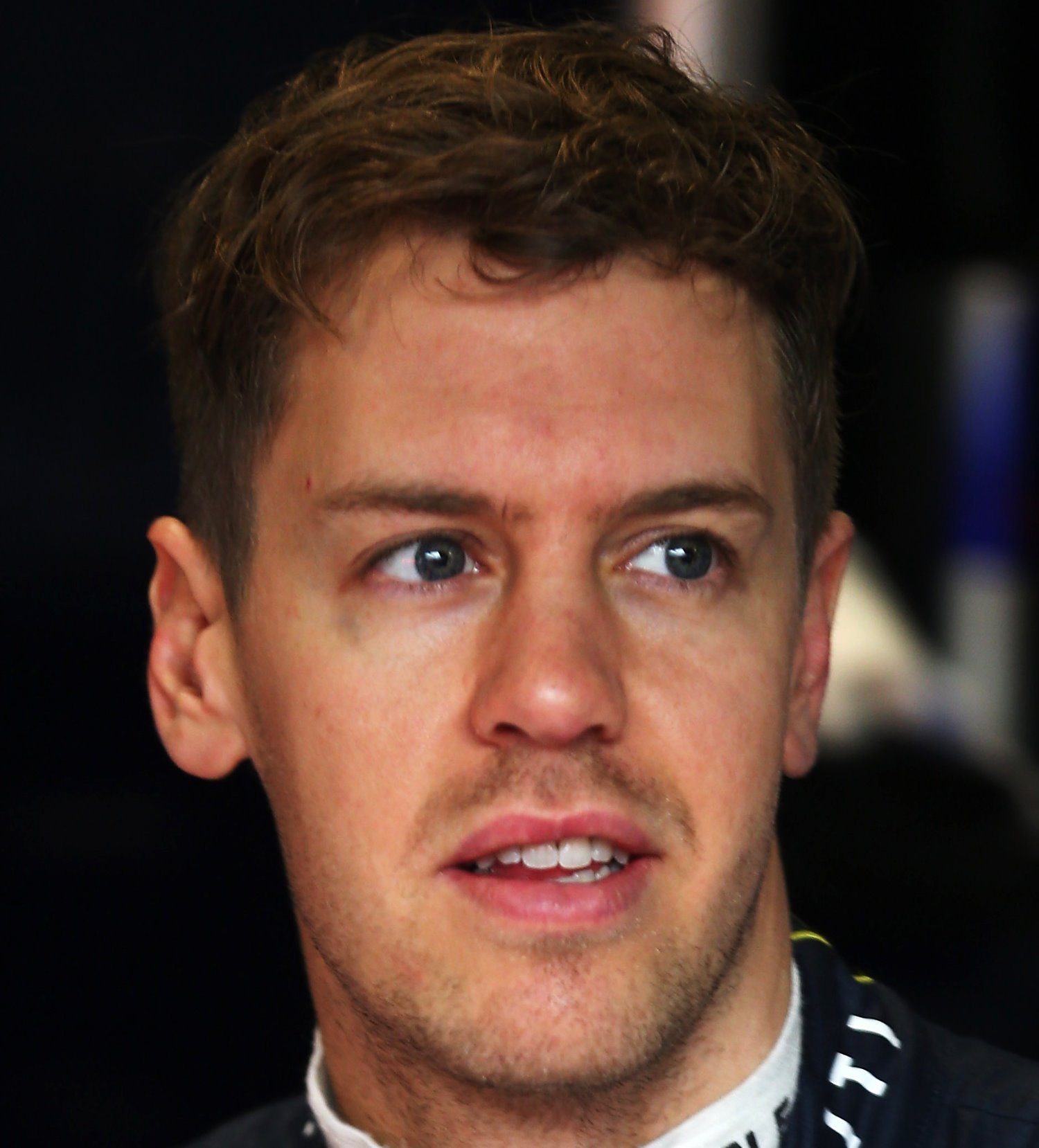Racing has never seen anyone like Sebastian Vettel
 |
| Sebastian Vettel |
Go ahead and say he has the best car. You’ll get no argument from me.
Feel free to point out that he often seems to be the beneficiary of incredibly good luck. While I don’t have any statistical data to confirm or refute such a notion, it does seem Sebastian Vettel enjoys his fair share of good fortune, particularly relative to his fun-loving Aussie Red Bull Racing teammate Mark Webber.
Also, don’t forget to remind everyone Vettel’s engineer at Red Bull Racing so happens to be Adrian Newey, the greatest aerodynamicist of this, or any, era. Again, you won’t get any pushback.
Now, I would offer that the driver in Formula One is often thought to be instrumental in developing the car in conjunction with the team. I'd likewise note that the opportunity to drive the best car is usually afforded the best drivers, for obvious reasons.
 |
| Vettel dominating in the wet at Monza in the Toro Rosso |
How soon everyone forgets that it was Vettel who took the lowly Toro Rosso to victory at Monza in 2008 in the wet in a very Aryton Senna-like performance, a win that cemented his drive for Red Bull.
Yet, for some reason, many seem determined to shower praise upon anyone and/or anything in finding an explanation for Vettel’s success, except Vettel himself.
And I suppose to what degree Vettel’s enormous run of success can be attributed to his supporting cast is open to debate. That said, a lot of people have enjoyed the luxury of the best car during their F1 career. Yet, there is no one with anything remotely close to Vettel’s accomplishments at such a young age.
Yes, if you take a moment to simply look at his results in the context of the sport’s history, it becomes clear that we are not witnessing simply the best driver of his era, maximizing superior equipment. Rather, we are potentially watching the beginnings of what may ultimately be the most prolific career, being engineered by the man who may go down as the greatest driver, in F1 history.
And while that may at first sound like a preposterous notion, keep in mind that Vettel has at the tender age of 26, already visited frontiers not previously explored; already carved out his own unique chapters of the Grand Prix record book.
Were Vettel to retire tomorrow, he would unquestionably be in the discussion with the greats of Grand Prix racing. Moreover, there is a mountain of overwhelming evidence suggesting Vettel’s best years may actually be ahead of him.
To begin, let’s take a brief look at what the three-time World Champion has already accomplished.
This past weekend, Vettel moved into sole possession of fourth-place on the career wins list with a sublime victory at the Singapore Grand Prix. Breaking a tie with second-place Singapore finisher Fernando Alonso on the career wins list, Vettel now trails only Ayrton Senna (41 wins), Alain Prost (51) and Michael Schumacher (91) for career victories.
To be clear, Senna, Prost, Schumacher is the complete list of drivers with more victories than Vettel.
Also, Vettel will likely record his fourth World Championship in 2013, which would move him into a tie with the somewhat underappreciated Prost for third, behind Juan Manuel Fangio (5) and Schumacher (7).
This is further evidence that, by the numbers, Vettel has already enjoyed a career of historic proportions. Only men named Schumacher, Fangio, and Prost lie ahead of him with regard to wins and/or championships. Vettel will likely soon join Prost.
 |
| Vettel's latest triumph – the 2013 Singapore GP |
But Vettel’s accomplishments become even more pronounced when you consider he turned 26 this past July 3rd. Prior to his 26th birthday, Vettel had recorded 29 of his 33 victories, and three world titles. And let the record show, there is no historical benchmark of any kind resembling a parallel to Vettel’s accomplishments at such a young age.
To illustrate this, let us briefly revisit the three men with more wins than Vettel — Schumacher, Prost and Senna. Prior to turning 26, Schumacher recorded 10 victories, Senna two, Prost none. Yes, the three men ahead of Vettel earned a combined twelve victories prior to turning 26, or stated another way: a combined 17 less than Vettel.
In fact, the only drivers who come closest to Vettel’s accomplishments prior to the age of 26, are two contemporaries, Fernando Alonso and Lewis Hamilton. Remember, we gooed and gushed, rightfully so, at the accomplishments of Alonso and Hamilton last decade. Alonso recorded 17 Grand Prix victories before the age of 26 and two world titles. Hamilton scored 13 wins and the 2008 World Championship before turning 26.
But again, Vettel combined for the same number of championships (3), and one more race win (30) before turning 26.
In short, when evaluating Vettel’s accomplishments by the metric of age, there is no parallel, with Alonso the only one even remotely close. Vettel didn't rewrite this chapter of the F1 record book, he is this chapter of the record book.
Now, here is where it gets even more interesting. If we look at all the world champions since 1970, the data suggests F1 drivers tend to peak in their late 20s and early 30s, some even later.
Of the 43 championships in that span, all but 10 were recorded by drivers older than 26. And remember, three of those 10 were Vettel himself.
Numerous drivers earned championships in their 30s. Nigel Mansell, for example, won the world title at 39, Mario Andretti at the age of 38. Damon Hill was 36, while Schumacher won five titles after turning 30. Jackie Stewart, Senna and Prost each won multiple championships in their 30s.
From this perspective, and remember this is 40 plus years of data, Vettel has yet to enter his prime.
Of course, I would argue the best evidence indicating Vettel might entirely re-write F1’s record books, remains what he has already done. Keep in mind, Vettel has not been obliterating overmatched, weak fields. Rather, he has rendered impressive contemporaries, who boast amazingly impressive resumes and are theoretically in the midst of their prime years, mere afterthoughts.
Alonso, the 2005 and 2006 World Champion, who remember is the fifth winningest driver of all-time, has continued as a race winner, but yet to find the formula to beat Vettel. Ditto for Hamilton, who is twelfth on the all-time wins list, with 22 victories, three less than Jimmy Clark and Niki Lauda.
Alonso at 32 and Hamilton at 28, are witnessing their prime years stripped away at the hands of Vettel. Alonso, for example, looks destined to finish second in the championship to Vettel for the third time in four years. Hamilton admitted this past weekend in Singapore he was no match for Vettel.
And to reiterate, men like Alonso and Hamilton, and to a lesser extent Kimi Raikkonen and Jenson Button are all world champions, who rank amongst the top-20 winningest drivers of all-time. They are not wankers. And they have driven for teams such as Ferrari, McLaren and Mercedes, who represent the gold standard in F1.
Yet, they have failed to mount anything resembling a consistent threat to Vettel and Red Bull.
Now, I will offer this. The trio of Alonso, Raikkonen and Button (all in their 30s) could from a certain perspective, provide evidence Vettel’s window to win championships is closing.
See, the fact Vettel has rendered someone like Alonso an afterthought in his early 30s, could be interpreted as evidence that F1 has become a younger man’s game since the turn of the century. Since Schumacher captured his last championship in 2004, no driver in his 30s has won a championship. The oldest title winner in that span was Button, who won the 2009 world title at the age of 29. Overall, the last nine champions have been in their 20s.
In other words, while there is great historical evidence Vettel’s best years are still ahead of him, recent evidence suggests those prime years may be dwindling.
But Raikkonen, Alonso and Button have remained race winners and there is little to suggest their form has dropped. So, even if F1 has skewed younger, there is nothing suggesting Vettel will drop significantly in form anytime soon.
Plus, the suggestion that Alonso, Button and Raikkonen forecast a potential decline for Vettel, when it is Vettel defeating them, seems farfetched.
Rather, the evidence overwhelmingly indicates we’ve yet to see the best from Vettel. And if that is the case, Schumacher’s 91 wins are not out of reach, but very attainable. Granted Vettel is 58 short, and the only person with 58 wins is Schumacher. Thus, in terms of wins, Vettel would have to have a better career than Alain Prost from this point forward to catch Schumacher.
But keep in mind, we have no precedent with regards to Vettel. After all, we’ve never seen anything like him.
Brian Carroccio is a Columnist for AutoRacing1.com. He lives in Rockville, MD and can be contacted at BrianC@AutoRacing1.com.
